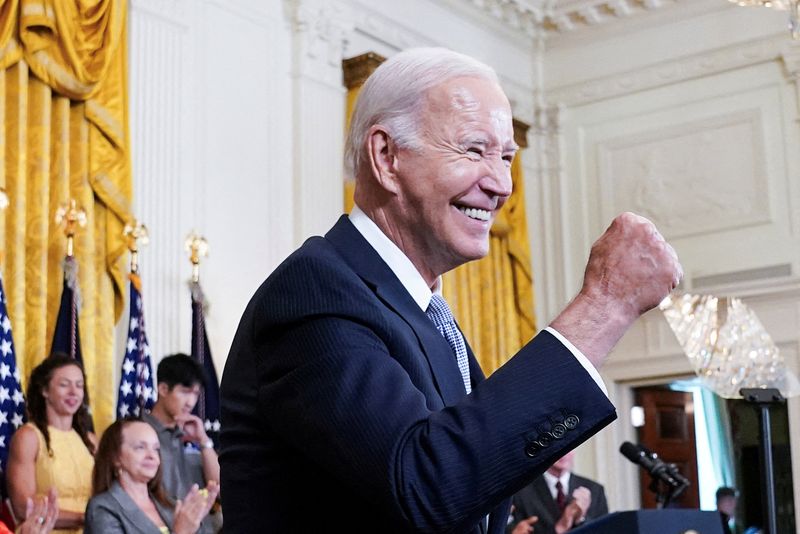By Trevor Hunnicutt, Hyonhee Shin and Sakura Murakami
WASHINGTON/SEOUL/TOKYO (Reuters) - When Yoon Suk Yeol this week commemorated his country's 1945 independence from Japan, the South Korean president did not dwell on the brutal 35-year occupation his people endured under their neighbor.
Instead, the 62-year-old leader, too young to remember the humiliations of Japanese rule, celebrated the country as a "partner" that now shares the same values and interests. Facing nuclear threats from North Korea - a constant worry for both Seoul and Tokyo - Yoon reserved his condemnation for "Communist aggression."
The Biden administration believes that a seismic but fragile realignment is underway in East Asia: a deeper relationship between two close U.S. allies with a long history of mutual acrimony and distrust. The change would accelerate Washington's effort to counter China's influence in the region and help it defend Taiwan.
U.S. President Joe Biden hopes to cement those ties with a summit at Camp David, the storied presidential retreat in Maryland's Catoctin Mountains, this Friday.
While the summit is unlikely to produce a formal security arrangement that commits the nations to each others' defense, they will agree to a mutual understanding about regional responsibilities.
"I find the meeting at Camp David mind blowing," Dennis Wilder, a professor at Georgetown University who once managed the Japan and South Korea relationship under former President George W. Bush, wrote on the social media platform X. "We could barely get South Korean and Japanese leaders to meet with us in the same room."
Behind the easing tensions, say diplomats from the three countries, is a shared concern about an increasingly aggressive China and an erratic North Korea.
But they credit, in particular, the initiative of Yoon and Japanese Prime Minister Fumio Kishida personally in seeking better ties.
Yoon's push to break the stalemate has provided "important momentum" for greater cooperation, South Korean deputy national security advisor Kim Tae-hyo told reporters, adding that the three leaders would spend the "longest time together ever" at Camp David.
A FRAGILE TRUCE?
To be sure, previous efforts to build closer ties between South Korea and Japan have stumbled. In 2019, a dispute over Japan's wartime treatment of Koreans led the Seoul to cancel a military intelligence-sharing agreement. Later that year, Japan placed restrictions on exports needed by Korean chips manufacturers.
This time, the dependence on the initiative on the three leaders is a risk. Some four in ten voters approve of Yoon, Kishida or Biden in the countries they govern, and there is little evidence the rapprochement is a priority for ordinary citizens.
Biden, an 80-year-old Democrat seeking another four-year term in the 2024 presidential elections, faces a likely opponent in Republican former President Donald Trump who has voiced skepticism about whether Washington benefits from its traditional military and economic alliances.
The White House, conscious of the electoral clock, wants to make the progress between South Korea and Japan hard to reverse, including by establishing routine cooperation on military exercises, ballistic missile defense, the economy, and scientific and technological research.
U.S. Indo-Pacific coordinator Kurt Campbell said the leaders would announce plans to make the summit an annual event and to invest in technology for a three-way crisis hot line. White House Senior Director for East Asia Mira Rapp-Hooper said they would also highlight progress towards sharing early-warning data on missile launches.
"We will confirm cooperation on a wide range of issues," said one Japanese foreign ministry official.
CHINA'S SUSPICIONS
Challenges remain, however.
On the same day that Yoon praised partnership with the Japanese, Kishida angered South Koreans by reportedly sending offerings to the Yasukuni shrine that honors some convicted World War II war criminals.
China blasted the move, seizing on a chance to embarrass Tokyo ahead of the Camp David summit. A decision by Japan to soon release treated radioactive water from the tsunami-wrecked Fukushima nuclear power plant into the ocean is giving Beijing another such opportunity.
No specific action by the trio in Camp David is expected to sharply escalate rhetoric with Beijing. Yet while each country wants to avoid provoking Beijing, China believes Washington is trying to isolate it diplomatically and encircle it militarily.
Biden aides have been seeking to ease tensions ahead of possible talks between Biden and Chinese President Xi Jinping later this year.
North Korea, meanwhile, has criticized deepening military ties between the three nations as part of a dangerous prelude to the creation of an "Asian version of NATO."
For his part, the country's leader Kim Jong Un has been courting Washington's biggest adversaries, China and Russia.

Just last month, Kim hosted Russia's defense minister and a Chinese Communist Party Politburo member in Pyongyang for an event celebrating the end of the 1950-1953 war between North and South Korea. The backdrop for the event was Pyongyang's ballistic missiles.
(This story has been refiled to add the full name and title for Japanese prime minister in paragraph 8)